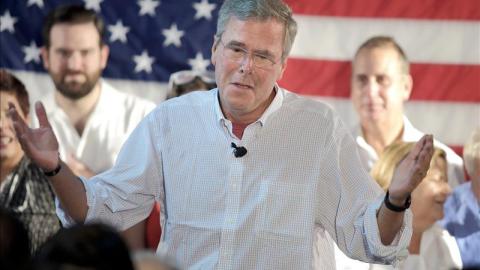Editorial: The Significance of Bush’s Retreat
Among Republicans, in the primary there is no room for moderate, pragmatic and tolerant conservatives anymore

Crédito: EFE
The South Carolina primary clarified the current state of the Republican Party. The victory of millionaire Donald Trump and the suspension of ex-Florida governor Jeb Bush’s campaign reaffirm the dominance of a populist, belligerent and religious rhetoric over a less dogmatic, more inclusive and tolerant one.
It’s hard to believe that, less than a year ago, Bush was the favorite contender for the Party’s nomination. He had experience, a conservative economic vision and a lot of money. However, his surname was a double-edged sword that did him no good – either hiding it or flaunting it. The candidate’s lack of charisma, which made him look bored, did not help, even though his proposals were more detailed and coherent than those presented by the favorite runners. To top it off, he was ill-prepared for Trump’s aggressiveness and for the fact that the mogul knew that the ex-governor was the rival to beat, at least on paper. In another time, Bush would have been his Party’s ideal candidate.
The Republican opposition to Barack Obama’s presidency led to the Party’s current internal revolution, in which the angriest, most frustrated candidates who are willing to invoke God more often soar in popularity. The image of Trump holding up a Bible like a pastor in church ‒ all the while insulting immigrants, sharing poll results and repeating how great he is ‒ seems like a bad joke.
Meanwhile, Senators Ted Cruz and Marco Rubio compete to become the alternative to Trump. Many in the establishment would prefer Trump’s pragmatism over the dogmatic Cruz, who has embarked on a religious crusade throughout the U.S. For his part, Rubio is emerging as an option in the eyes of the establishment, and his religious message is able to go toe to toe with Cruz’s without sounding like an ideologue, as became evident during the Iowa caucus. Rubio’s flip-flopping on the immigration issue shows a flexibility ‒ a malleability ‒ that pleases the establishment.
Ronald Reagan, who was a Democrat before he became a Republican hero, once said that he did not leave the Democratic Party but rather “the party left me.” After South Carolina, Jeb Bush could say the same thing and join the chorus of pragmatic Republicans who are fiscally conservative and socially moderate, and who are respectful enough not to impose their religious values onto everyone else.




